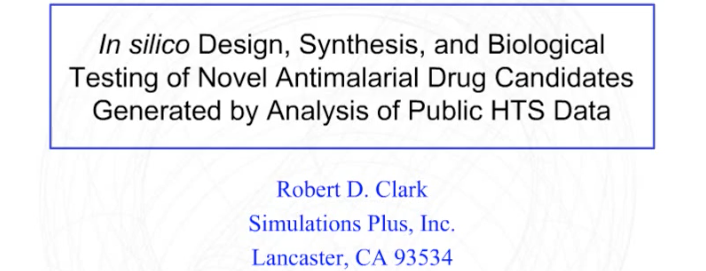Major Pharmaceutical Company to Fund Transdermal and Subcutaneous Drug Absorption Model in GastroPlus

Simulations Plus Signs Collaboration Agreement
Major Pharmaceutical Company to Fund Enhanced Oral Cavity Model in GastroPlus™

Simulations Plus Reports Preliminary Third Quarter FY2012 Results
Net sales increase 4.9% to new 3rd quarter record of $2.77 million

Novel physiologically based pharmacokinetic modeling of patupilone for human pharmacokinetic predictions
Patupilone (EPO906) is a novel potent microtubule stabilizer, which has been evaluated for cancer treatment. A novel physiologically based pharmacokinetics (PBPK) model was developed...

Classification of Inhibitors of Hepatic Organic Anion Transporting Polypeptides (OATPs): Influence of Protein Expression on Drug- Drug Interactions
The hepatic organic anion transporting polypeptides (OATPs) influence the pharmacokinetics of several drug classes and are involved in many clinical drug-drug interactions.

Clinical outcome in patients receiving systemic therapy for metastatic sarcomatoid renal cell carcinoma: a retrospective analysis
Objectives: Sarcomatoid metastatic renal cell carcinoma (mRCC) represents an aggressive subset of disease, and a definitive therapeutic strategy is lacking. We seek to define...

Tissue-selective regulation of androgen-responsive genes
Introduction: Androgens regulate a wide array of physiological processes, including male sexual development, bone and muscle growth, and behavior and cognition. Because...

Predicted toxicity of naphthenic acids present in oil sands process-affected waters to a range of environmental and human endpoints
Naphthenic acids (NAs) are considered to be a major toxic component of oil sands process-affected waters (OSPW) and are also widely used for industrial processes.

Developability assessment of clinical drug products with maximum absorbable doses
Maximum absorbable dose refers to the maximum amount of an orally administered drug that can be absorbed in the gastrointestinal tract.

Malaria Project Webinar
This webinar by Dr. Robert Clark describes the in silico design, synthesis, and biological testing of novel antimalarial drug candidates generated by analysis of public HTS data.

Simulations Plus (SLP) Releases MedChem Studio 3.0 and MedChem Designer 2.0
Molecule Design Tools Used in Company’s Malaria Drug Design Project Released

Biowaiver approach for biopharmaceutics classification system class 3 compound metformin hydrochloride using in silico modeling
The dependency of metformin in vivo disposition on the rate and extent of dissolution was studied.

Development of a Robust Cytopathic Effect-Based High-Throughput Screening Assay To Identify Novel Inhibitors of Dengue Virus
We have developed a robust cytopathic effect-based high-throughput screening assay to identify inhibitors of dengue virus (DENV) infection.

Simulations Plus (SLP) Releases GastroPlus™ 8.0
Major New Upgrade Increases Power of Its Best-in-Class Software

Parameters for pyrethroid insecticide QSAR and PBPK/PD models for human risk assessment
In this review we have examined the status of parameters required by pyrethroid QSAR-PBPK/PD models for assessing health risks.

Simulations Plus Releases ADMET Predictor™ 6.0
Integrates MedChem Designer™ Molecule Drawing, Features Graphical User Interface Improvements and Further Enhanced Molecular Property Predictions

Simulations Plus Announces Next Quarterly Cash Dividend
Company declares cash dividend of $0.05 per share

In Silico Metabolite Prediction Using Artificial Neural Network Ensembles
Drug metabolism plays a crucial role in understanding bioavailability and drug-drug interactions, as well as in the design of prodrugs and in avoiding undesirable toxic metabolites.

Circadian Variations in Exsorptive Transport: In Situ Intestinal Perfusion Data and In Vivo Relevance
The circadian timing system (CTS) governs the 24-h rhythm of the organism and, hence, also main pathways responsible for drug pharmacokinetics.

Simulations Plus Announces Further Success in Malaria Drug Design Project
Activity Seen Against Both Drug-Sensitive and Drug-Resistant Strains
